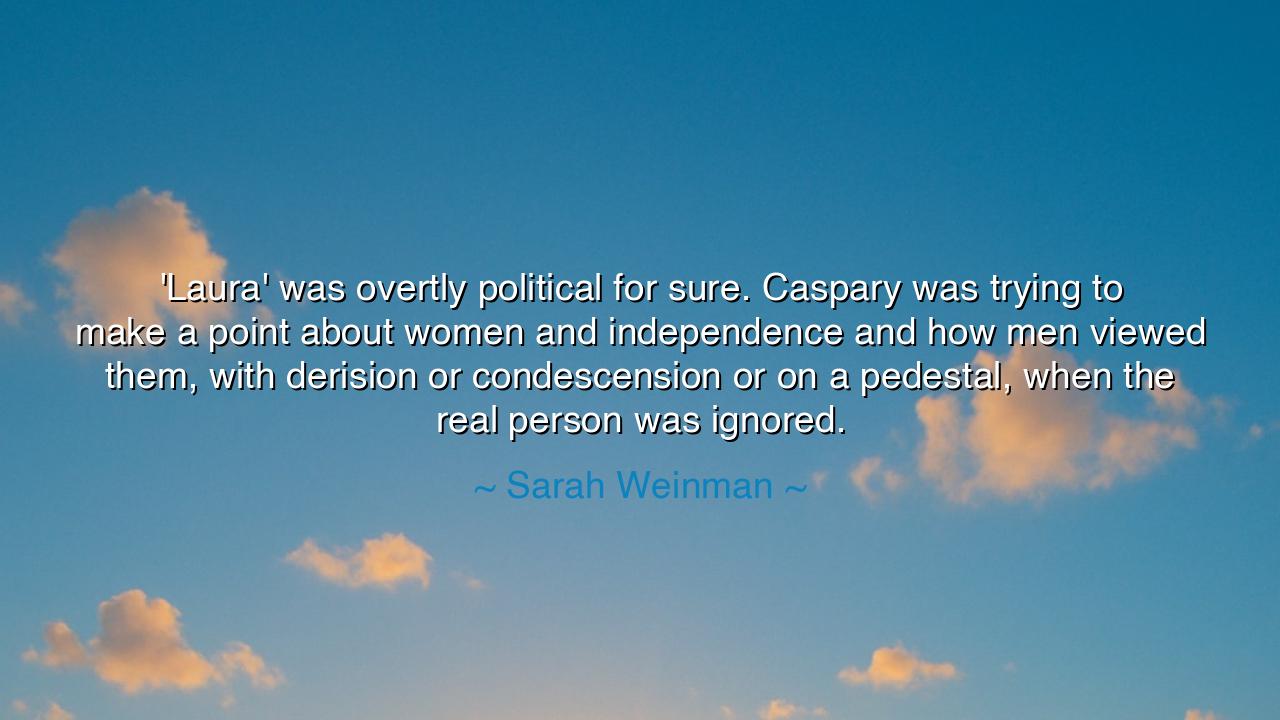
'Laura' was overtly political for sure. Caspary was trying to
'Laura' was overtly political for sure. Caspary was trying to make a point about women and independence and how men viewed them, with derision or condescension or on a pedestal, when the real person was ignored.






The words of Sarah Weinman, when she said, “‘Laura’ was overtly political for sure. Caspary was trying to make a point about women and independence and how men viewed them, with derision or condescension or on a pedestal, when the real person was ignored,” speak with the weight of both art and truth. These words are not only a reflection upon a story, but upon the eternal struggle of women and independence — the timeless quest to be seen, not as symbols or ideals, but as complete human beings. Beneath Weinman’s analysis lies a wisdom that stretches far beyond the pages of Vera Caspary’s ‘Laura’: the warning that society, when blind with pride or prejudice, creates illusions of women instead of seeing their reality.
In the novel ‘Laura’, written by Vera Caspary in 1942, the titular character is surrounded by men who each construct their own fantasy of who she is. To one, she is a muse; to another, a prize; to yet another, a reflection of his own desires. But none see her truly. This, Weinman tells us, was Caspary’s true rebellion — her political statement, cloaked in the garments of a mystery novel. Through Laura, Caspary dared to reveal how society shapes women into myths — the saint, the siren, the subordinate — and how in doing so, it strips them of their reality. Thus, independence, for a woman in Caspary’s time, was not merely about work or money, but about identity — the right to exist as herself, unfiltered by the eyes of others.
The ancients too spoke of such blindness. In the myths of Greece, we find Pygmalion, who carved from stone the perfect woman of his imagination — Galatea — and loved her not for her spirit, but for her beauty and obedience. The gods, pitying him, gave his statue life. But what is this tale, if not a warning? Pygmalion’s love was not for a person, but for a projection. He adored the image of woman, not woman herself. And so, through myth and history, we see the truth repeated: that to place anyone upon a pedestal is not to honor them, but to confine them. To deify is to deny humanity. This is the same veil of delusion Caspary sought to tear through her story — the same veil Weinman unveils for us again.
Weinman’s words also speak of derision and condescension, the twin poisons that have long shadowed women who dare to claim their autonomy. When a woman asserts her independence, she is too often met with mockery; when she shows ambition, she is accused of arrogance; when she seeks equality, she is branded ungrateful. Society, uneasy with her freedom, shifts between belittling and idolizing her — anything but recognizing her as equal. This shifting gaze, neither loving nor just, is the cage that Caspary sought to expose. Through the story of Laura, she held a mirror to her age — and, by reflection, to ours.
Yet, there is a quiet triumph within this truth. For Laura, despite the illusions cast upon her, remains her own person — intelligent, capable, and unwilling to be defined. Her strength lies in her refusal to become anyone’s fantasy. She stands as a symbol of all who strive to be seen in their fullness: flawed, complex, and real. This, Weinman reminds us, is the heart of Caspary’s politics — that true empowerment lies not in being adored, but in being understood. Independence, in its purest form, is not rebellion for rebellion’s sake, but the courage to live truthfully.
We see this echoed throughout history. Think of Marie Curie, who pursued her studies in science when the world told her a woman could not. Men, astonished by her brilliance, called her an exception — placing her upon a pedestal rather than acknowledging that her achievements were proof of a broader truth: that genius knows no gender. She bore their praise as she bore their envy, continuing her work in silence and dignity. Her story, like Laura’s, is one of quiet defiance — of refusing to be an image and choosing instead to be a person.
So, O listener, take this lesson to heart. Beware the comfort of illusion, for it blinds you to the sacred reality of others. Whether in love, friendship, or judgment, seek to see people as they are, not as you wish them to be. To idealize is to erase; to understand is to honor. And for those who seek independence, remember that your worth lies not in how others perceive you, but in how truthfully you live your own story.
Thus, the teaching endures: to see others clearly is to love them rightly. The wisdom of Weinman and Caspary is a mirror to all ages — that equality begins with recognition, and recognition begins with humility. Let us, then, cast aside the pedestals and the prejudices alike, and meet one another in the clear light of truth, where the real person — not the illusion — can finally be seen, honored, and free.






AAdministratorAdministrator
Welcome, honored guests. Please leave a comment, we will respond soon